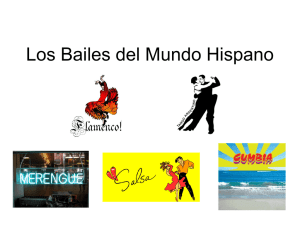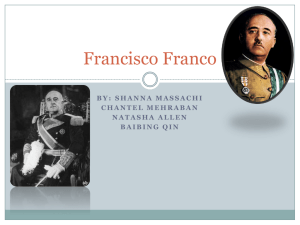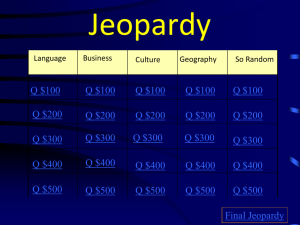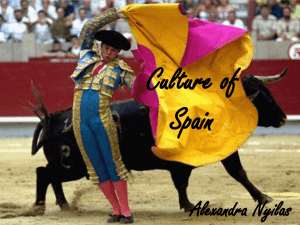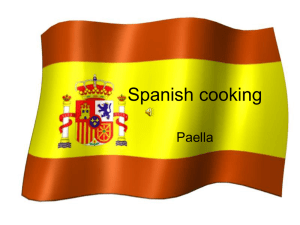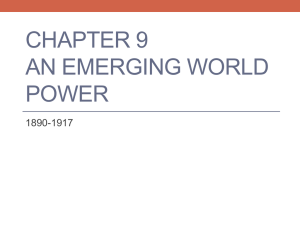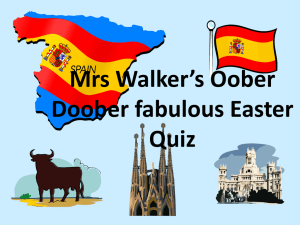España - Montgomery County Schools
advertisement
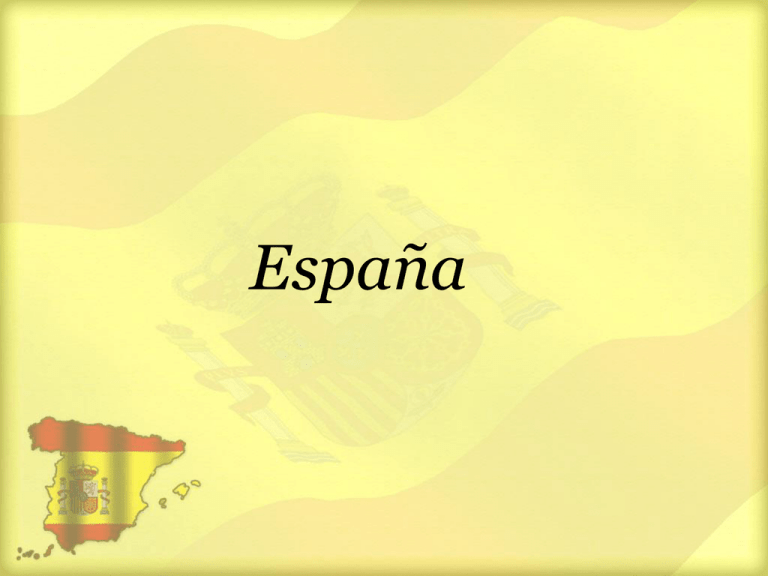
España España (Spain): Capital: Madrid Population: 40,448,191 Religions: Roman Catholic 94%, other 6% Currency: Euros España: Historia • Spain was ruled by the Romans for seven centuries. • In 1492, the Catholic Monarchs began the era of Spanish expansion. • In 711 A.D., the moors invaded and ruled parts of Spain. • Explorers and missionaries colonized parts of the Caribbean and Central and South America. • After wars with France, England, and the United States, the Spanish empire was weakened España: Historia • After the 1936-1939 civil war, general Francisco Franco ruled Spain until his death in 1976. • Today, Spain is a democratic nation. España: Geografía Los Picos de Europa is the largest national park in all of Europe. After Switzerland, Spain is the most mountainous country in Europe. La Doñana is a nature reserve along the coast of Andalusia, is home to many protected bird species. La meseta is Spain’s interior high plateau. It covers 15,000 square miles and has a continental climate similar to that of Montana, with very cold winters. España: Fun facts • Eusquera: The language of the basque region, is not related to any other language in the world. Its origins date back to the stone age. • El ave: A high speed train linking Madrid and Seville. It carries passengers between the two cities in three hours, less than half the time it would take to drive. España: Fun facts • Pablo Picasso (cofounder of the Cubist movement) spent the majority of his life in exile due to the dictatorship of General Franco. España: La comida (food) • La paella is the most well known Spanish dish. • There are three widely known types of paella: Valencian paella, seafood paella and mixed paella but there are many others as well. España: La comida (food) • Paella consists of the following ingredients: white rice, green vegetables, meat (rabbit, chicken, duck) land snails, beans and seasoning. Seafood paella replaces meat and snails with seafood and omits beans and green vegetables. Mixed paella is a free-style combination of meat, seafood, vegetables, and sometimes beans. España: Bullfighting • Bullfighting is a traditional spectacle of Spain, Portugal, southern France and some Latin American countries (Mexico, Colombia, Venezuela, Peru and Ecuador), in which one or more bulls are baited in a bullring for sport and entertainment. • It is often called a blood sport by its detractors but followers of the spectacle regard it as a fine art and not a sport as there are no elements of competition in the proceedings. España: Bullfighting • The tradition, as it is practiced today, involves professional toreros (also called toreadors) who execute various formal moves which can be interpreted and innovated according to the bullfighter's style or school. • Toreros seek to elicit inspiration and art from their work and an emotional connection with the crowd transmitted through the bull. España: Bullfighting • After the bull has been hooked multiple times behind the shoulder by other matadors in the arena the bullfight usually concludes with the killing of the bull by a single sword thrust which is called estocada. • Supporters of bullfighting argue that it is a culturally important tradition and a fully developed art form on par with painting, dancing and music, while animal rights advocates hold that it is a blood sport resulting in the suffering of bulls and horses. España: Running of the Bulls • The Running of the Bulls is a practice that involves running in front of a small group (typically a dozen) of bulls that have been let loose, on a course of a sectioned-off subset of a town's streets. • Unlike bullfights, which are performed by professionals, anyone may participate in an encierro. España: Running of the Bulls • The purpose of this event was originally to transport the bulls from the off-site corrals where they had spent the night, to the bullring where they would be killed in the evening. Youngsters would jump among them to show off their bravado. España: Running of the Bulls • Spanish lore says the true origin began in North-eastern Spain during the early 14th century. While transporting cattle in order to sell at the market, men would attempt to speed the process by hurrying their cattle using tactics of fear and excitement. After years of this practice, the transportation and hurrying began to turn into a competition, as young adults would attempt to race in front of the bulls and make it safely to their pens without being overtaken. When the popularity of this practice increased and was noticed more and more by the expanding population of Spanish cities, a tradition was created and stands to this day. España: Running of the Bulls España: Personas famosas (famous people) • Antonio Banderas is a Spanish actor, perhaps best known for his roles in Desperado and The Mask of Zorro and won an Image Award for Best Actor in 2006. • He provided the voice for Puss in Boots in Shrek. • 1996 Banderas starred opposite Madonna in Evita, the musical about the life of Eva Peron. • Banderas returned to collaborating with Robert Rodriguez in the Spy Kids trilogy and also in the last film in the 'Mariachi' trilogy, Once Upon A Time In Mexico, which also featured Johnny Depp on the cast list. España: Personas famosas (famous people) • Penelope Cruz is a Spanish actress who has successfully made the transition into mainstream Hollywood films. • She intrigued audience members and Tom Cruise in Vanilla Sky and won the Academy Award for Best Supporting Actress for Vicky Cristina Barcelona. • She starred alongside Matt Damon in All the Pretty Horses. España: Personas famosas (famous people) • Enrique Iglesias has become one of the most influential Latin American singers. He is the son of Julio Iglesias, a famous Spanish singer who has sold over 300 million records worldwide in 14 languages and released 80 albums. • He is a Grammy award-winner who is known for singing the #1 hit, "Be with You" in 2000, and "Hero" in 2001, and has sold over 100 million records. • He has won over 25 Billboard Latin Music Awards and won the BestSelling Pop Male Artist and European Male Artist World Music Award for his album Escape in 2002. http://www.youtube.com/watch?v=93zlJYQMT8U


